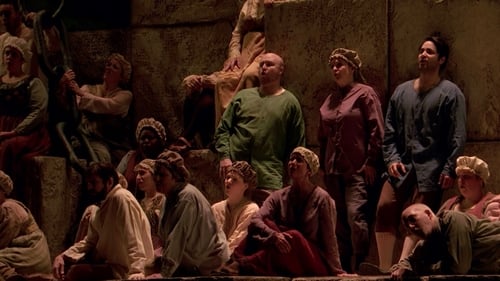
Director
Nabucco, King of Babylon, takes Jerusalem in his war with the Israelites – but his daughter Fenena loves the Israelite Ismaele. She releases their prisoners, leading her vengeful half-sister Abigaille to plot to take power. Nabucco declares himself a god and is struck by a bolt of lightning. Abigaille tricks the now feeble king into signing a death warrant for the Israelites, including Fenena and Ismaele. Nabucco prays to the God of Israel for forgiveness; his sanity is restored and he saves the prisoners from death. He converts himself and his people, while Abigaille commits suicide.

Director

Director
NABUCCO may be Verdi's first masterpiece, and not just because of that amazing Chorus of Hebrews which is justly beloved by everyone who hears it. Dramatically, this opera is tightly constructed, with believable characters in an intense conflict over values and beliefs. And Verdi's music, however early in his career, however distant from triumphs like LA FORSA DEL DESTINO or AIDA, is highly animated, revealing inner turmoil and outer passions with beauty and economy. The ensembles are especially impressive, building to satisfying heights of emotional release for the singers and the audience. And Placido Domingo is a wonder to behold and hear. Even though his original voice was baritone, which he managed to transform into a tenor voice, he doesn't SOUND like a baritone to me. B-U-T his performance is so committed, so deeply interfused with Verdi's music, so generously integrated to the younger singers around him, that the waters part.

Director
Live performance at Teatro La Fenice, Venice, September 25-28 2010. Myung-Whun Chung conducting Orchestra e Coro del Teatro La Fenice. Directed for the stage by Daniele Abbado.

Production Design
«Набу́кко», или «Навуходоно́сор» (итал. Nabucco) — опера Джузеппе Верди в 4 действиях, 7 картинах на либретто Т. Солера, основанная на событиях, описанных в Библии. (Набукко — сокращённая итальянская интерпретация имени царя Навуходоносора II). Именно эта опера, третья в творчестве Верди, принесла ему настоящую славу. В ней повествуется о бедствиях евреев, об их пленении вавилонянами, а затем отпущении на родину царём Вавилона Навуходоносором.
Премьера состоялась 9 марта 1842 года в театре «Ла Скала» в Милане. Первая постановка окончательной версии прошла в Театро Сан-Джакомо на Корфу в сентябре 1844.
В состав оперы входит знаменитый «хор евреев» Va, pensiero, sull’ali dorate — «Лети, мысль, на золотых крыльях».



